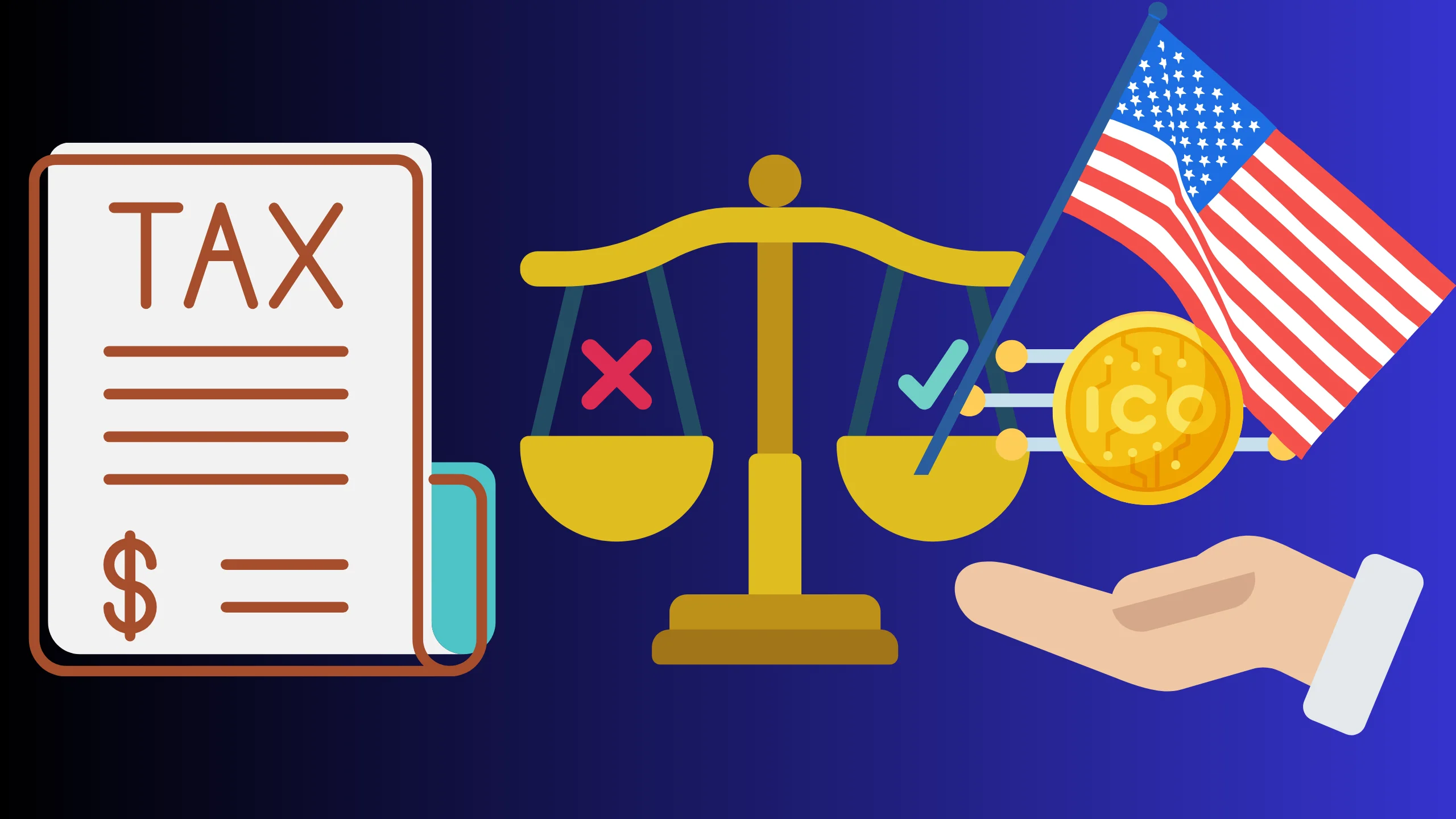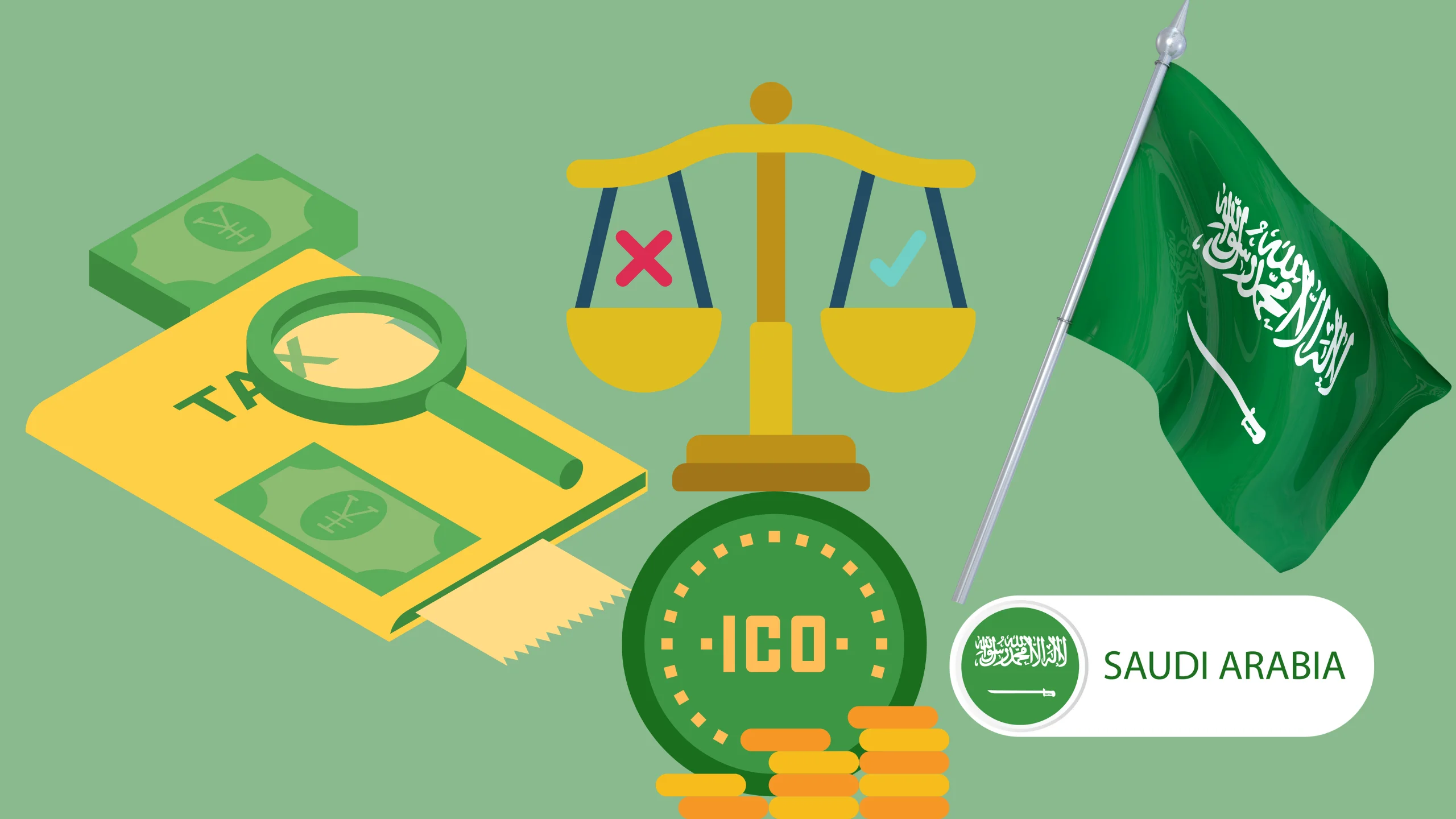Introduction
Tax Considerations for ICOs in the United States

Navigating the tax landscape for Initial Coin Offerings (ICOs) in the United States requires a comprehensive understanding of tax laws and regulations. ICO participants and issuers must consider various tax implications, including classification of tokens, capital gains tax, income tax, and reporting requirements. In this section, we’ll explore key tax considerations for ICOs in the United States, including tax rates, providing insights and links to official government sources for further guidance.
Tax Considerations in the United States
- Income Tax: ICO proceeds received as tokens are generally treated as income for tax purposes in the United States. Individuals and businesses are subject to income tax on the gains derived from ICO activities. The tax rates for income tax in the US range from 10% to 37%, depending on the individual’s or business’s tax filing status and income level.
- Capital Gains Tax: Profits from the sale or exchange of tokens are subject to capital gains tax in the United States. Short-term capital gains (assets held for less than a year) are taxed at ordinary income tax rates, while long-term capital gains (assets held for over a year) are subject to lower tax rates ranging from 0% to 20%, depending on the individual’s income level.
- Reporting Requirements: ICO participants and issuers are required to comply with tax reporting requirements set forth by the Internal Revenue Service (IRS). They must accurately report income derived from ICO activities, including gains from token sales, on their tax returns. Failure to fulfill tax obligations may result in penalties or enforcement actions by tax authorities.
- Regulatory Guidance: The Securities and Exchange Commission (SEC) and the IRS provide regulatory guidance on the tax treatment of tokens and ICOs. ICO participants and issuers should consult official guidance from these regulatory bodies to ensure compliance with tax laws and regulations.
- Tax Planning: Effective tax planning strategies can help ICO participants and issuers optimize their tax positions and minimize tax liabilities. Strategies may include timing token sales to take advantage of favorable tax rates, structuring ICO activities to maximize deductions, and leveraging available tax incentives and credits.
Sources
- Internal Revenue Service (IRS) – https://www.irs.gov/
- Securities and Exchange Commission (SEC) – https://www.sec.gov/
Tax Considerations for ICOs in the United Kingdom
The United Kingdom provides a regulatory framework for Initial Coin Offerings (ICOs) that encompasses tax considerations for both participants and issuers. Understanding the tax implications of ICOs in the UK is essential for compliance with HM Revenue & Customs (HMRC) regulations. In this section, we’ll explore key tax considerations for ICOs in the United Kingdom, including tax rates, providing insights and helpful resources to official government sources for further guidance.
Tax Considerations in the United Kingdom
- Income Tax: ICO proceeds received as tokens are generally treated as income for tax purposes in the United Kingdom. Individuals and businesses are subject to income tax on the gains derived from ICO activities. The tax rates for income tax in the UK range from 20% to 45%, depending on the individual’s or business’s tax filing status and income level.
- Capital Gains Tax: Profits from the sale or exchange of tokens are subject to capital gains tax in the United Kingdom. Individuals are subject to capital gains tax rates ranging from 10% to 20%, depending on their total taxable gains and income tax bracket. Businesses may be subject to corporation tax on gains from ICO activities.
- Value Added Tax (VAT): VAT may apply to ICO transactions in the United Kingdom, depending on the nature of the goods or services exchanged for tokens. ICO issuers and participants should consult official guidance from HMRC to determine VAT obligations. The standard VAT rate in the UK is 20%, but certain goods and services may qualify for reduced rates or exemptions.
- Tax Reporting for ICO Issuers: ICO issuers must comply with HMRC tax reporting requirements for income generated from token sales. They are required to accurately report income derived from ICO activities and comply with VAT reporting obligations if applicable. Failure to fulfill tax obligations may result in penalties or enforcement actions by tax authorities.
- Tax Incentives: The UK government offers various tax incentives and schemes to support innovation and entrepreneurship, which may benefit ICO participants and issuers. These incentives include the Enterprise Investment Scheme (EIS) and the Seed Enterprise Investment Scheme (SEIS), which provide tax relief for investors in qualifying startups and businesses.
Citations

Tax Considerations for ICOs in Germany
Tax Considerations in Germany
- Income Tax: ICO proceeds received as tokens are generally treated as income for tax purposes in Germany. Individuals and businesses are subject to income tax on the gains derived from ICO activities. The tax rates for income tax in Germany range from 0% to 45%, depending on the individual’s or business’s tax filing status and income level.
- Capital Gains Tax: Profits from the sale or exchange of tokens are subject to capital gains tax in Germany. Individuals are subject to capital gains tax rates ranging from 0% to 45%, depending on the duration of asset ownership and total taxable gains. Businesses may be subject to corporate tax on gains from ICO activities, with a standard rate of 15%.
- Value Added Tax (VAT): VAT may apply to ICO transactions in Germany, depending on the nature of the goods or services exchanged for tokens. ICO issuers and participants should consult official guidance from the German tax authorities (Bundeszentralamt für Steuern) to determine VAT obligations. The standard VAT rate in Germany is 19%, but certain goods and services may qualify for reduced rates or exemptions.
- Tax Reporting for ICO Issuers: ICO issuers must comply with German tax reporting requirements for income generated from token sales. They are required to accurately report income derived from ICO activities and comply with VAT reporting obligations if applicable. Failure to fulfill tax obligations may result in penalties or enforcement actions by tax authorities.
- Tax Incentives: Germany offers various tax incentives and schemes to support innovation and investment, which may benefit ICO participants and issuers. These incentives include tax credits for research and development (R&D) activities, investment allowances, and tax relief for startups and small businesses.
Source List
- German Federal Financial Supervisory Authority (BaFin) – https://www.bafin.de/DE/Startseite/startseite_node.html
- Bundeszentralamt für Steuern (Federal Central Tax Office) –
Tax Considerations for ICOs in France

France has established tax regulations governing Initial Coin Offerings (ICOs) that impact both participants and issuers. Understanding the tax implications of ICOs in France is essential for compliance with French tax laws. In this section, we’ll explore key tax considerations for ICOs in France, including tax rates, providing insights and additional resources to official government sources for further guidance.
Tax Considerations in France
- Income Tax: ICO proceeds received as tokens are generally treated as income for tax purposes in France. Individuals and businesses are subject to income tax on the gains derived from ICO activities. The tax rates for income tax in France range from 0% to 45%, depending on the individual’s or business’s tax filing status and income level.
- Capital Gains Tax: Profits from the sale or exchange of tokens are subject to capital gains tax in France. Individuals are subject to capital gains tax rates ranging from 0% to 30%, depending on the duration of asset ownership and total taxable gains. Businesses may be subject to corporate tax on gains from ICO activities, with a standard rate of 28%.
- Value Added Tax (VAT): VAT may apply to ICO transactions in France, depending on the nature of the goods or services exchanged for tokens. ICO issuers and participants should consult official guidance from the French tax authorities (Direction générale des finances publiques) to determine VAT obligations. The standard VAT rate in France is 20%, but certain goods and services may qualify for reduced rates or exemptions.
- Tax Reporting for ICO Issuers: ICO issuers must comply with French tax reporting requirements for income generated from token sales. They are required to accurately report income derived from ICO activities and comply with VAT reporting obligations if applicable. Failure to fulfill tax obligations may result in penalties or enforcement actions by tax authorities.
- Tax Incentives: France offers various tax incentives and schemes to promote innovation and investment, which may benefit ICO participants and issuers. These incentives include tax credits for research and development (R&D) activities, investment allowances, and tax relief for startups and small businesses.
Related Sources
- Direction générale des finances publiques (French Directorate General of Public Finance) – https://www.impots.gouv.fr/
Tax Considerations for ICOs in the United Arab Emirates (UAE)
The United Arab Emirates (UAE) has emerged as a dynamic hub for blockchain and cryptocurrency innovation, with a business-friendly environment and favorable tax regime. Understanding the tax implications of Initial Coin Offerings (ICOs) in the UAE is crucial for participants and issuers operating in the region. In this section, we’ll explore key tax considerations for ICOs in the UAE, including tax rates, providing insights and Sources to official government sources for further guidance.
Tax Considerations in the UAE
- No Personal Income Tax: One of the key advantages of conducting ICOs in the UAE is the absence of personal income tax. ICO participants who receive tokens as income generally do not incur personal income tax on their gains. This favorable tax treatment makes the UAE an attractive jurisdiction for ICO activities.
- Corporate Tax: The UAE imposes a corporate tax rate of 0% on most businesses operating in designated free zones. However, companies conducting ICOs outside of free zones may be subject to corporate tax at varying rates, depending on the emirate in which they operate and the nature of their business activities.
- Value Added Tax (VAT): The UAE introduced a 5% Value Added Tax (VAT) in 2018, which applies to the sale of goods and services, including certain transactions related to ICOs. ICO issuers and participants should assess whether their activities are subject to VAT and comply with reporting requirements accordingly.
- Regulatory Environment: While the UAE does not have specific regulations governing ICOs, businesses operating in the country must adhere to applicable laws and regulations issued by regulatory authorities such as the Securities and Commodities Authority (SCA) and the Dubai Financial Services Authority (DFSA).
- Tax Planning: ICO participants and issuers in the UAE can leverage various tax planning strategies to optimize their tax positions and minimize liabilities. These strategies may include structuring ICO activities to take advantage of tax incentives, establishing entities in tax-efficient jurisdictions, and seeking advice from tax professionals familiar with the UAE tax regime.
Resources
- Ministry of Finance – https://www.mof.gov.ae/en/Pages/default.aspx
- Securities and Commodities Authority (SCA) – https://www.sca.gov.ae/en/Pages/default.aspx

Tax Considerations for ICOs in Saudi Arabia

Saudi Arabia is increasingly becoming a significant player in the global blockchain and cryptocurrency landscape, with growing interest in Initial Coin Offerings (ICOs). Understanding the tax implications of ICOs in Saudi Arabia is essential for both participants and issuers operating in the country. In this section, we’ll delve into key tax considerations for ICOs in Saudi Arabia, including tax rates and regulatory guidance, providing insights and Resources to official government sources for further guidance.
Tax Considerations in Saudi Arabia
- Income Tax: Saudi Arabia does not impose personal income tax on individuals. Therefore, ICO participants who receive tokens as income generally do not incur personal income tax on their gains. This absence of personal income tax is one of the key attractions for businesses and investors considering ICO activities in Saudi Arabia.
- Corporate Tax: Saudi Arabia levies a flat corporate income tax rate of 20% on the net income of resident companies. However, companies operating in certain industries or economic sectors may benefit from tax incentives and exemptions provided by the Saudi Arabian General Investment Authority (SAGIA).
- Value Added Tax (VAT): Saudi Arabia introduced a 5% Value Added Tax (VAT) in 2018, which applies to the sale of goods and services, including certain transactions related to ICOs. ICO issuers and participants should assess whether their activities are subject to VAT and comply with reporting requirements accordingly.
- Regulatory Environment: While Saudi Arabia does not have specific regulations governing ICOs, businesses conducting ICOs in the country must adhere to applicable laws and regulations issued by regulatory authorities such as the Saudi Arabian Monetary Authority (SAMA) and the Capital Market Authority (CMA).
- Tax Planning: ICO participants and issuers in Saudi Arabia can explore various tax planning strategies to optimize their tax positions and minimize liabilities. These strategies may include structuring ICO activities to leverage available tax incentives, establishing entities in tax-efficient jurisdictions, and seeking advice from tax professionals with expertise in the Saudi Arabian tax regime.
Additional Resources
- Saudi Arabian General Investment Authority (SAGIA) – https://www.sagia.gov.sa/en
- Saudi Arabian Monetary Authority (SAMA) –
- Capital Market Authority (CMA) – https://www.cma.org.sa/en
Tax Considerations for ICOs in India
Tax Considerations in India
- Income Tax: ICO proceeds received as tokens are generally treated as income for tax purposes in India. Both individuals and businesses are subject to income tax on the gains derived from ICO activities. The tax rates for income tax in India vary based on the taxpayer’s income slab, ranging from 5% to 30%, with an additional surcharge for high-income earners.
- Capital Gains Tax: Profits from the sale or exchange of tokens are subject to capital gains tax in India. Short-term capital gains (assets held for less than three years) are taxed at the individual’s applicable income tax rate, while long-term capital gains (assets held for more than three years) are subject to a flat tax rate of 20% with indexation benefits.
- Goods and Services Tax (GST): The supply of goods or services in exchange for tokens may attract Goods and Services Tax (GST) in India, depending on the nature of the transaction. ICO issuers and participants should assess whether their activities are subject to GST and comply with reporting requirements accordingly.
- Regulatory Environment: The regulatory landscape for ICOs in India is evolving, with authorities such as the Securities and Exchange Board of India (SEBI) and the Reserve Bank of India (RBI) issuing guidelines and warnings regarding cryptocurrency-related activities. Participants and issuers must navigate regulatory uncertainties and comply with relevant laws and regulations.
- Tax Reporting and Compliance: ICO participants and issuers in India must ensure compliance with tax reporting requirements set forth by the Income Tax Department. They are required to accurately report income derived from ICO activities and comply with GST reporting obligations if applicable. Failure to fulfill tax obligations may result in penalties or enforcement actions by tax authorities.
Source References
- Goods and Services Tax Network (GSTN) – https://www.gstn.org.in/

Conclusion
In the ever-evolving landscape of cryptocurrencies and blockchain technology, the tax considerations and implications for ICOs represent a crucial yet often overlooked aspect of this burgeoning industry. Throughout our exploration, we have traversed the intricate web of tax laws and regulations, uncovering the complexities and nuances that shape the taxation landscape for ICOs.
From income tax to capital gains tax, from VAT to regulatory compliance, we have delved into the myriad factors that must be carefully considered by participants and issuers alike. Navigating this labyrinthine terrain requires diligence, expertise, and a keen understanding of the evolving regulatory landscape.
As we conclude our journey, it is evident that compliance with tax laws is not merely a legal obligation but a strategic imperative for the success of ICO ventures. By ensuring compliance and adopting sound tax planning strategies, stakeholders can mitigate risks, optimize their tax positions, and pave the way for sustainable growth and innovation in the blockchain and cryptocurrency ecosystem.
Looking ahead, as the regulatory environment continues to evolve and mature, staying informed and proactive will be essential for navigating the ever-changing landscape of tax considerations for ICOs. By embracing transparency, accountability, and compliance, we can foster trust, credibility, and legitimacy within the industry, laying the foundation for a brighter and more prosperous future for ICOs and the broader blockchain community.
In closing, let us remain vigilant, adaptable, and committed to upholding the highest standards of integrity and responsibility as we chart a course towards a more transparent, equitable, and inclusive financial future powered by blockchain technology and ICOs.
How SDLC CORP Can Help in ICO Services
Initial Coin Offerings (ICOs) remain a pivotal method for fundraising and launching new blockchain projects. SDLC CORP offers specialized ICO services to guide and support your project from inception to market success.
Explore our ICO services:
Partner with SDLC CORP for expert guidance and execution in ICO marketing, strategy consulting, and development, ensuring your project achieves its fundraising goals and reaches its target audience effectively
Share a few details about your project, and we’ll get back to you soon.
Let's Talk About Your Project
- Free Consultation
- 24/7 Experts Support
- On-Time Delivery
- sales@sdlccorp.com
- +1(510-630-6507)
